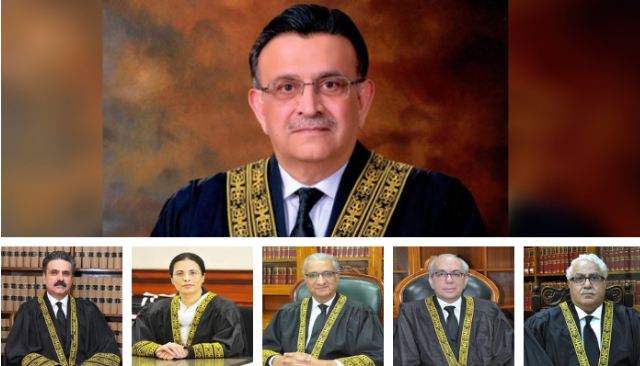ISLAMABAD, JUN 26 (DNA) — The Supreme Court on Monday adjourned the hearing of petitions pertaining to the trials of accused of May 9 riots in army courts, till Tuesday.
The six-member bench headed by Chief Justice of Pakistan Umar Ata Bandial and comprising Justice Ijaz ul Ahsan, Justice Yahya Afridi, Justice Munib Akhter, Justice Mazahar Ali Akbar Naqvi and Justice Ayesha Malik heard the case.
Earlier, the seven-member bench was dissolved after Justice Mansoor Ali Shah recused himself from the case and then a six-member new bench was formed to continue the proceedings. At the outset of hearing, the court rejected the request of Salman Akram Raja seeking a stay order against the trial of civilian accused in military courts in connection with the May 9 incidents.
The CJP remarked that the matter was related to basic human rights, as neither Section-II of the Army Act was above the Constitution nor it could deprive the civilian accused of basic rights. He asked whether the word ‘court martial’ had been used anywhere other than the Army Act. The bench wanted to view the verdicts related to the military courts.
The CJP observed that there were some basic requirements of disciplinary tribunal, and it was not correct that a military court was equal to the sessions court. He asked lawyer Salman Akram Raja whether the verdicts referred by him were related to the trials of terrorists in military courts, and whether the decisions of army courts could not be challenged.
The lawyer replied that the military court verdicts could only be challenged before the Army Chief or a committee formed by him. The CJP remarked that “you may say” the scope of appeal should be expanded in that case.
He observed that the 21st Constitutional Amendment mentioned the application of Army Act against the accused involved in picking guns against armed forces. The CJP asked the AGP that what was the progress regarding trials in military courts, saying the bench needed some assurances.
The court hoped that no accused would be tried in army courts during hearing of the matter by the apex court, he added. He also asked the AGP to provide the complete details of 102 accused who were in the custody of army, directing provision of basic facilities to the arrested people, including permission to meet their families.
AGP Mansoor Usman Awan said the interrogation of accused was underway and it was possible that many of them might be released later. Those who had not attacked on “prohibited areas” would be set free, he added.
Justice Mazahar Ali Naqvi said it was being stated that some people were completely missing. To this, the AGP said he could get the information if the bench shared their names.
Justice Munib questioned why a constitutional petition could not be moved in a high court against army courts’ decisions. To this Salman Akram Raja said a high court could not describe the status of those courts.
Justice Munib asked whether an anti-terrorism court was a forum for the trial of accused of terrorism cases. Salman Akram Raja said the civilians involved in crimes related to anti-state activities were tried in civil courts in the United States.
Justice Ayesha Malik noted that the lawyer was challenging the Army Act but he was not opposing the trials of civilians in army courts. She questioned whether the military courts had the status of courts.
Salman Akram Raja argued that the civilian accused were not used to be provided rights in army courts. He said trial of civilians along with army men had been mentioned in the Army Act due to which they had challenged the law. He said the trials of army officers in Britain and the US were run in certain situation only.
Salman Akram Raja said his client was even not allowed to meet his son. He prayed the court to issue a stay order against the trial which was turned down by the bench. Further hearing of the case was then adjourned till Tuesday. — DNA

















